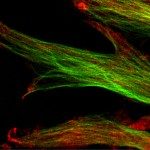Link to Pubmed [PMID] – 23941183
J. Am. Chem. Soc. 2013 Aug;135(32):11929-34
Macromolecular crowding affects most chemical equilibria in living cells, as the presence of high concentrations of macromolecules sterically restricts the available space. Here, we characterized the influence of crowding on a prototypical RTX protein, RC(L). RTX (Repeat in ToXin) motifs are calcium-binding nonapeptide sequences that are found in many virulence factors produced by Gram-negative bacteria and secreted by dedicated type 1 secretion systems. RC(L) is an attractive model to investigate the effect of molecular crowding on ligand-induced protein folding, as it shifts from intrinsically disordered conformations (apo-form) to a stable structure upon calcium binding (holo-form). It thus offers the rare opportunity to characterize the crowding effects on the same polypeptide chain under two drastically distinct folding states. We showed that the crowding agent Ficoll70 did not affect the structural content of the apo-state and holo-state of RC(L) but increased the protein affinity for calcium. Moreover, Ficoll70 strongly stabilized both states of RC(L), increasing their half-melting temperature, without affecting enthalpy changes. The power law dependence of the melting temperature increase (ΔT(m)) on the volume fraction (φ) followed theoretical excluded volume predictions and allowed the estimation of the Flory exponent (ν) of the thermally unfolded polypeptide chain in both states. Altogether, our data suggest that, in the apo-state as found in the crowded bacterial cytosol, RTX proteins adopt extended unfolded conformations that may facilitate protein export by the type I secretion machinery. Subsequently, crowding also enhances the calcium-dependent folding and stability of RTX proteins once secreted in the extracellular milieu.
